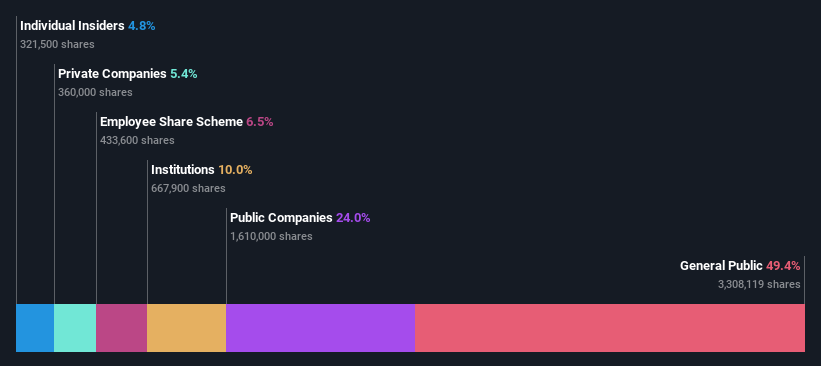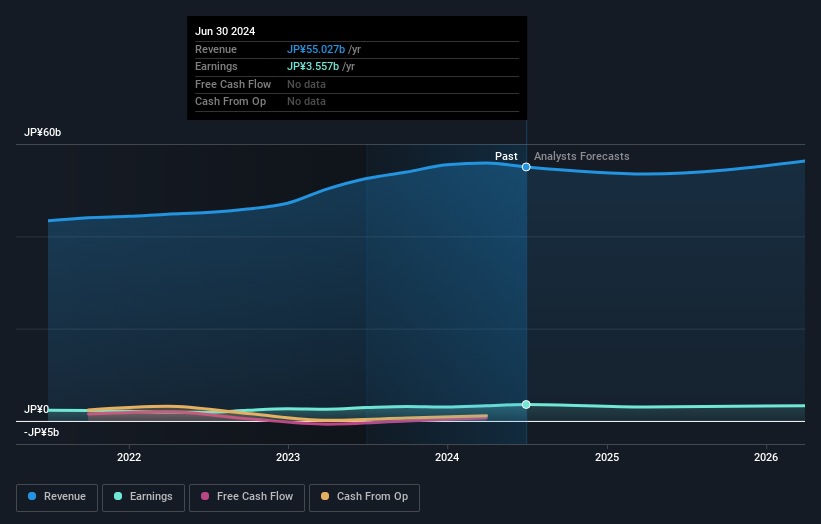Individual investors among Nippon Dry-Chemical Co., Ltd.'s (TSE:1909) largest stockholders and were hit after last week's 11% price drop

Key Insights
- Nippon Dry-Chemical's significant individual investors ownership suggests that the key decisions are influenced by shareholders from the larger public
- The top 17 shareholders own 50% of the company
- Ownership research, combined with past performance data can help provide a good understanding of opportunities in a stock
If you want to know who really controls Nippon Dry-Chemical Co., Ltd. (TSE:1909), then you'll have to look at the makeup of its share registry. With 49% stake, individual investors possess the maximum shares in the company. In other words, the group stands to gain the most (or lose the most) from their investment into the company.
As market cap fell to JP¥21b last week, individual investors would have faced the highest losses than any other shareholder groups of the company.
Let's delve deeper into each type of owner of Nippon Dry-Chemical, beginning with the chart below.
View our latest analysis for Nippon Dry-Chemical

What Does The Institutional Ownership Tell Us About Nippon Dry-Chemical?
Institutions typically measure themselves against a benchmark when reporting to their own investors, so they often become more enthusiastic about a stock once it's included in a major index. We would expect most companies to have some institutions on the register, especially if they are growing.
As you can see, institutional investors have a fair amount of stake in Nippon Dry-Chemical. This can indicate that the company has a certain degree of credibility in the investment community. However, it is best to be wary of relying on the supposed validation that comes with institutional investors. They too, get it wrong sometimes. When multiple institutions own a stock, there's always a risk that they are in a 'crowded trade'. When such a trade goes wrong, multiple parties may compete to sell stock fast. This risk is higher in a company without a history of growth. You can see Nippon Dry-Chemical's historic earnings and revenue below, but keep in mind there's always more to the story.

Nippon Dry-Chemical is not owned by hedge funds. The company's largest shareholder is Sohgo Security Services Co.,Ltd., with ownership of 16%. With 6.5% and 3.5% of the shares outstanding respectively, Nippon Dry-Chemical Co., Ltd., Client Stock Ownership Association and Milestone Asset Management Co.,Ltd are the second and third largest shareholders.
Looking at the shareholder registry, we can see that 50% of the ownership is controlled by the top 17 shareholders, meaning that no single shareholder has a majority interest in the ownership.
While studying institutional ownership for a company can add value to your research, it is also a good practice to research analyst recommendations to get a deeper understand of a stock's expected performance. While there is some analyst coverage, the company is probably not widely covered. So it could gain more attention, down the track.
Insider Ownership Of Nippon Dry-Chemical
While the precise definition of an insider can be subjective, almost everyone considers board members to be insiders. Management ultimately answers to the board. However, it is not uncommon for managers to be executive board members, especially if they are a founder or the CEO.
I generally consider insider ownership to be a good thing. However, on some occasions it makes it more difficult for other shareholders to hold the board accountable for decisions.
We can report that insiders do own shares in Nippon Dry-Chemical Co., Ltd.. It has a market capitalization of just JP¥21b, and insiders have JP¥1.0b worth of shares, in their own names. This shows at least some alignment, but we usually like to see larger insider holdings. You can click here to see if those insiders have been buying or selling.
General Public Ownership
The general public-- including retail investors -- own 49% stake in the company, and hence can't easily be ignored. This size of ownership, while considerable, may not be enough to change company policy if the decision is not in sync with other large shareholders.
Private Company Ownership
It seems that Private Companies own 5.4%, of the Nippon Dry-Chemical stock. Private companies may be related parties. Sometimes insiders have an interest in a public company through a holding in a private company, rather than in their own capacity as an individual. While it's hard to draw any broad stroke conclusions, it is worth noting as an area for further research.
Public Company Ownership
It appears to us that public companies own 24% of Nippon Dry-Chemical. This may be a strategic interest and the two companies may have related business interests. It could be that they have de-merged. This holding is probably worth investigating further.
Next Steps:
I find it very interesting to look at who exactly owns a company. But to truly gain insight, we need to consider other information, too. For example, we've discovered 2 warning signs for Nippon Dry-Chemical (1 is significant!) that you should be aware of before investing here.
If you would prefer discover what analysts are predicting in terms of future growth, do not miss this free report on analyst forecasts.
NB: Figures in this article are calculated using data from the last twelve months, which refer to the 12-month period ending on the last date of the month the financial statement is dated. This may not be consistent with full year annual report figures.
Valuation is complex, but we're here to simplify it.
Discover if Nippon Dry-Chemical might be undervalued or overvalued with our detailed analysis, featuring fair value estimates, potential risks, dividends, insider trades, and its financial condition.
Access Free AnalysisHave feedback on this article? Concerned about the content? Get in touch with us directly. Alternatively, email editorial-team (at) simplywallst.com.
This article by Simply Wall St is general in nature. We provide commentary based on historical data and analyst forecasts only using an unbiased methodology and our articles are not intended to be financial advice. It does not constitute a recommendation to buy or sell any stock, and does not take account of your objectives, or your financial situation. We aim to bring you long-term focused analysis driven by fundamental data. Note that our analysis may not factor in the latest price-sensitive company announcements or qualitative material. Simply Wall St has no position in any stocks mentioned.
About TSE:1909
Nippon Dry-Chemical
Engages in the design, manufacture, and sale of fire extinguishing equipment, fire engines, security systems, etc.
Flawless balance sheet, undervalued and pays a dividend.
Market Insights
Community Narratives




